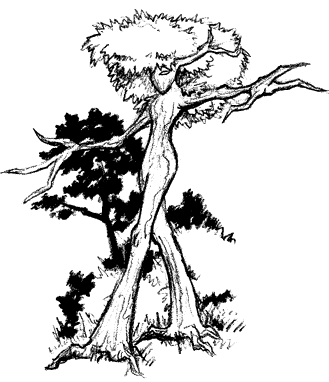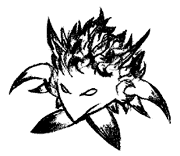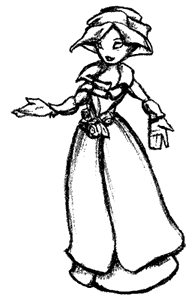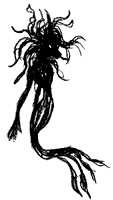


 There are many energies that comprise the world of Ironclaw, though those best known to the dwellers of Calabria are Fire, Water, Air and Earth. There are some who have attempted to apply the basic concepts of Elementalism to other "elements," with mixed results. One such offshoot of Elementalism, obscure enough that it is not recognized by Dunwasser College, is that of Arborean Magic - or, its practitioners would call it, the "Element of Wood."
There are many energies that comprise the world of Ironclaw, though those best known to the dwellers of Calabria are Fire, Water, Air and Earth. There are some who have attempted to apply the basic concepts of Elementalism to other "elements," with mixed results. One such offshoot of Elementalism, obscure enough that it is not recognized by Dunwasser College, is that of Arborean Magic - or, its practitioners would call it, the "Element of Wood."
This spell list lacks an important advantage of Elementalism, in that the various elements cannot be studied as part of the same career, but it makes up for this with broader application of spell effects.
Arborean Career
Include with: Literacy, Lore: Arborean Magic, and Meditation
Note: At the Game Host's discretion, Lore of Arborean Magic and Elementalism may overlap. Using one type of Lore to try to find information on a topic appropriate to the other may still be possible, though at a -1 Penalty.
This Wizardly Career grants you the Arborean Apprentice Spell List.
Arborean Magic - Apprentice Spell List
Requirements: The Arborean Career Trait at d4 or better
| Avert Wood | ||||
| Cost: 1 | Difficulty: 1d10 | Type: Regular | Effect: Shield a target from hostile Arborean Magic | |
|
This spell protects a single combatant from hostile Arborean Magic. For the duration of this Scene, the target gains the following benefits:
|
||||
|
|
||||
| Create Wood | ||||
| Cost: 1 | Difficulty: 1d10 | Type: Regular | Effect: Create wood from thin air | |
| Conjures up plant life where before there was none. An Effect Score of 2 or more creates a quarter-stone of plant material, or an eighth-stone of wood. An Effect Score of 6 creates a half stone of plant material, or a quarter-stone of wood. This is raw material, not fine workmanship; it can conjure up a simple stick or a bundle of flowers, but if the caster wants a wooden mask, a spoon, a bludgeon, et cetera, Mold Wood would be required to get the desired shape. The exact type of wood or plant material summoned is not under the control of the caster, though the Game Host should grant him a little more leeway with a higher effect score; in general, the type of plant or wood will be very common, and - if possible - found in the local area. | ||||
|
|
||||
| Destroy Wood | ||||
| Cost: 1 | Difficulty: 1d10 | Type: Regular | Effect: Destroy a small part of wood | |
| Disintegrates a small amount of wood or plant matter. No To-Hit Roll is needed. An Effect Roll of 2 or more destroys about an eighth stone of wood/plants; an Effect Roll of 6 or more destroys about a quarter-stone, or does 1 hit of damage to a Wood Elemental. This spell can be used to destroy wooden weapons that weigh a quarter-stone, and can punch a small hole through a normal wooden door or wall. | ||||
|
|
||||
| Grow Wood | ||||
| Cost: 1 | Difficulty: 1d10 | Type: Regular | Effect: Accelerate the growth of plants | |
| Causes existing plant life (a single tree, a cluster of bushes or vines, a patch of grass, a small garden) to grow at an accelerated rate. The maximum area of effect is equal to the Effect Score in paces squared. An Effect Score of 2 causes days' worth of growth in just a few minutes; an Effect Score of 6 can causes months' worth of growth. This accelerated growth comes at a price: it drains nutrients from the soil, rendering it dry and infertile. Therefore, while this spell can force a flower to bloom, or even (with multiple castings) make a field grow to harvest, the soil will be rendered void and lifeless, unwilling to yield life in the future. | ||||
|
|
||||
| Heal Wood | ||||
| Cost: 1 | Difficulty: 1d10 | Type: Regular | Effect: Repair damage done to wood or plant life | |
| Mends damage to wood or plant life; can fix broken arrows, graft broken branches or blossoms, mend axe damage done to a tree. If cast on a Wood Elemental, roll 1d10 against the Body of the Elemental; any Hit scored is a Wound healed. For repairing damage to large objects (such as tables or doors), similar rules apply, though it is up to the Game Host to determine how many Wounds and what Body such objects might have. | ||||
|
|
||||
| Scry Wood | ||||
| Cost: 1 | Difficulty: 1d10 | Type: Regular | Effect: Scan wood for information |
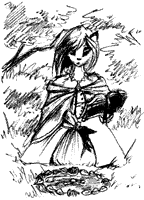
|
| Scan the local Wood for information. Among other things, this spell will reveal if any Arborean Magic (or any spells related to the growth/manipulation of plant life) was cast in the last few hours, if any Wood Elementals are present, and the general composition of local plant life. The maximum range is a dozen paces. See the Scry Test, p. 148 of the rulebook, for how this spell works; the Scrying Difficulty is 2d8. | ||||
|
|
||||
| Will o' the Wisp | ||||
| Cost: 1 | Difficulty: 1d10 | Type: Regular | Effect: Cause a piece of wood to glow | |
| This spell causes a wooden object to glow faintly, casting just enough light to read by, and not enough to blind anyone. For every point of magic force, a 5 pace area around the object is illuminated; no darkness penalties apply. If the object is portable, it may be carried with the caster; the light will last for a Scene, or approximately 5 minutes. | ||||
Arborean Magic - Journeyman Spell List
Requirements: Adept at any five Arborean Apprentice Spells
| Animate Tree | |||||||||
| Cost: 4 | Difficulty: 4d12 | Type: Regular | Effect: Create a "Wood Elemental" | ||||||
|
This spell animates a normal living tree so that it becomes for all intents and purposes
a Dryad, under the command of the caster. For the remainder of the Scene, the Dryad will
obey the commands of the caster, without need of a Command Dryad spell, but when it is not
being directed by the caster, it will stand motionless (even to the point of not defending
itself from attack).
Other Arborean Mages can just as easily command a Dryad summoned in this way. In such a case, if two Arborean Mages are wrestling over control of a created Dryad, whomever wins a contest of their Will and Arborean Career Traits gets control for this round. ("Command Dryad" is also a way to wrest control.) A typical "Dryad" animated in this way will have the same basic statistics as a Dryad, with a Dryad Trait equal to the caster's own Arborean Career Trait, but it will not have any Magic Points, nor the ability to use Arborean Magic spells. Plants other than trees can be animated as well; for statistics of such "Wood Elementals," see some of the sample statistics given below. |
|||||||||
|
|
|||||||||
| Arborean Journeyman's Privilege | |||||||||
| Cost: 1 | Difficulty: 1d12 | Type: Privilege | Effect: Instantly cancel any Apprentice Arborean Spell | ||||||
| Attempts to dispel the effect of any one Apprentice Arborean Spell. See p. 197 of the rulebook for a description of how this works. Can be used as a Defense on any combatant the caster can see. | |||||||||
|
|
|||||||||
| Bounty of the Wild | |||||||||
| Cost: 2 | Difficulty: 2d8 | Type: Regular | Effect: Target includes Arborean Trait with Survival | ||||||
| Until the next sunrise or sunset, whichever comes first, the caster and any traveling with him may add his Arborean Career Trait to Survival rolls, so long as they are in a well-vegetated area (such as a forest). | |||||||||
|
|
|||||||||
| Call Dryad | |||||||||
| Cost: 4 | Difficulty: 4d12 | Type: Regular | Effect: Call a Wood Elemental | ||||||
| The caster may call forth an Elemental Creature of the Wood. What actually shows up is determined by the Host; if the area has local wood spirits, those would be the most likely to arrive. | |||||||||
|
|
|||||||||
| Herbal Salve | |||||||||
| Cost: 3 | Difficulty: 3d4 | Type: Regular | Effect: Heal a character as a 3d4 "attack" vs. Body | ||||||
| This spell only works so long as the caster is in a vegetated area. If so, she may draw upon the healing energies of plant life to aid the target, with the Effect Dice applied against the Body of the target as a "damage" roll. Each Hit scored heals one Wound on the target. If used to heal a Wood Elemental, each Hit scored heals two Wounds on the target instead. | |||||||||
|
|
|||||||||
| Intervening Branches | |||||||||
| Cost: 3 | Difficulty: 3d8 | Type: Regular | Effect: Target includes Arborean Trait with Dodge | ||||||
| For the duration of this Scene, the target may include the caster's Arborean Trait Dice with all rolls to Dodge. Other rolls are unaffected. | |||||||||
|
|
|||||||||
| Obliging Boughs | |||||||||
| Cost: 2 | Difficulty: 2d8 | Type: Regular | Effect: Target includes Arborean Trait with Climbing | ||||||
| For the duration of this Scene, the target may include the caster's Arborean Trait Dice with all rolls to Climb trees or any surface with an abundance of vegetation (such as a vine-choked wall). It offers no bonuses to climb sheer walls, buildings, et cetera, without plants at hand to magically assist the climber. | |||||||||
|
|
|||||||||
| Splinters | |||||||||
| Cost: 4 | Difficulty: 4d10 | Type: Exploding | Effect: Hurt a Cluster for 4d10 Exploding Damage | ||||||
| Nearby plants and wooden objects shoot out thorns and splinters that shower through the air. | |||||||||
|
|
|||||||||
| Tangling Underbrush | |||||||||
| Cost: 3 | Difficulty: 3d8 | Type: Regular | Effect: Target suffers a -1 Penalty to Dodge Dice | ||||||
| For the duration of this Scene, the target suffers a -1 Penalty to all Dodge Dice. Other rolls are unaffected. | |||||||||
|
|
|||||||||
| Trailblaze | |||||||||
| Cost: 2 | Difficulty: 2d8 | Type: Regular | Effect: Target includes Arborean Trait with Hiking | ||||||
| Until the next sunrise or sunset, whichever comes first, the caster and all traveling with her may add her Arborean Career Trait to Hiking tests, so long as they are in a well-vegetated area, such as a forest. | |||||||||
|
|
|||||||||
| Veridian Spear | |||||||||
| Cost: 3 | Difficulty: 3d12 | Type: Targeting | Effect: Hurls 3d12 damage at Range | ||||||
Creates a twisted shaft of wood and plant material that the caster hurls at his opponent with great ferocity. Roll To-Hit as per a Targeting Spell (p. 196).
Special: Tangle. Vines, burrs, and tangling bits of vegetation spring forth from the weapon, and wrap around the target. The target is now at a -1 Penalty to all actions that involve Speed. (The target may opt not to include Speed dice with a particular roll, to avoid this Penalty.) This penalty is not cumulative from multiple hits. The tangling vegetation may be removed if the victim spends a Round doing nothing but trying to remove the vines, and beats the Trait Dice of the Dryad with Contortion and Strength. The vegetation will be destroyed if the target suffers at least one Wound from a fire-based attack, or will simply fall apart after the end of this Scene. |
|||||||||
|
|
|||||||||
| Wooden Spirit | |||||||||
| Cost: 4 | Difficulty: 4d8 | Type: Synecdoche | Effect: Create a magical representation of the caster at a distance |

|
|||||
| This spell is identical to Lesser Eidolon, as described on p. 237 of the rulebook, with the exception that the inanimate object that the caster is projected into must be a tree or other plant. | |||||||||
Arborean Magic - Master Spell List
Requirements: Adept at any five Arborean Journeyman Spells
| Arborean Master's Privilege | ||||
| Cost: 1 | Difficulty: 1d12 | Type: Privilege | Effect: Instantly cancel any Journeyman Arborean Spell | |
| Attempts to dispel any one Journeyman Arborean Spell. See p. 197 of the rulebook for a description of how this works. Can be used as a Defense on any combatant the caster can see. | ||||
|
|
||||
| Bind Dryad | ||||
| Cost: 3 | Difficulty: 3d12 | Type: Delayed | Effect: Captures a Wood Elemental into a material object | |
|
This spell captures a Wood Elemental into a material object. (This cannot be a pseudo-elemental created with the "Animate Tree" spell.)
The elemental can then be called forth later, at need. The typical object for containing the dryad is a jade stone, but the Host may rule that other objects may work as well. If the object is broken, the elemental is released. When the elemental is released, the spell ends and the caster may recover her Magic Points.
If the object is a weapon, it becomes magical and can now strike at creatures only hurt by magical attacks. When the weapon is swung, it seems to shift and writhe as if alive. The weapon's Damage now includes the Dryad Trait Dice of the Bound elemental. In addition, the weapon gains an extra Special result. (As with all weapons with multiple Specials, you may only choose one of them per Overwhelming Success.)
Special: Tangle. Vines, burrs, and tangling bits of vegetation spring forth from the weapon, and wrap around the target. The target is now at a -1 Penalty to all actions that involve Speed. (The target may opt not to include Speed dice with a particular roll, to avoid this Penalty.) This penalty is not cumulative from multiple hits. The tangling vegetation may be removed if the victim spends a Round doing nothing but trying to remove the vines, and beats the Trait Dice of the Dryad with Contortion and Strength. The vegetation will be destroyed if the target suffers at least one Wound from a fire-based attack, or will simply fall apart after the end of this Scene. If the object is clothing or armor, it becomes magical. The wearer may now include the Dryad Trait of the Bound elemental with her Camouflage and Herbalism Dice. The wearer treats all Water, Earth and Wood Damage as Enervated, and all Fire and Air Damage as Slaying. |
||||
|
|
||||
| Cloak of the Forest | ||||
| Cost: 3 | Difficulty: 3d8 | Type: Regular | Effect: Add Arborean Career Trait to target's Camouflage and Stealth | |
| Until the next sunrise or sunset, and only so long as the target is within a well-vegetated area, the caster's Arborean Career Trait dice are added to the target's Camouflage and Stealth, as well as to the Difficulty Dice of any attempt to Track the target. | ||||
|
|
||||
| Command Dryad | ||||
| Cost: 4 | Difficulty: 4d12 | Type: Regular | Effect: Force a Wood Elemental to obey | |
| Forces a Wood Elemental to do the caster's bidding. For the duration of this Scene, whenever the caster Concentrates, she may attempt to control the elemental. Treat this as an Influence Test (p. 139) using the caster's Arborean Trait and Will vs. the difficulty of what she is trying to get the elemental to do. The caster must Concentrate for at least one Round to give the elemental orders via mental command. When the caster is not ordering it to act, she may choose other actions. Remember that elementals have alien senses and desires as compared to our own, and when not specifically under the caster's control, they may act in unexpected ways. | ||||
|
|
||||
| Eyes of the Forest | ||||
| Cost: 3 | Difficulty: 3d8 | Type: Regular | Effect: Add a Career Trait to Tracking and Observation | |
| Add the caster's Arborean Career Trait to the target's Tracking and Observation dice until the next sunrise or sunset, whichever comes first, only so long as the target is within a well-vegetated area. | ||||
|
|
||||
| Nature's Fury | ||||
| Cost: 5 | Difficulty: 5d12 | Type: Homing | Effect: Damages a Group with sharp wooden barbs |
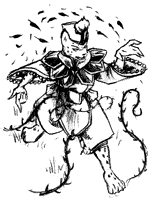
|
| A hail of wooden slivers, bladed leaves, sharp thorns and tangled brambles leap forth from the caster's fingertips to smite a Group of his foes with 5d12 Homing Damage. See "Homing," p. 197, for more details on this type of spell. | ||||
|
|
||||
| Wooden Avatar | ||||
| Cost: 5 | Difficulty: 5d8 | Type: Synecdoche | Effect: Create a magical representation of the caster, at a distance | |
| This spell is identical to Greater Eidolon, on p. 240, with the exception that the inanimate object the caster is projected to may only be a tree or other form of plant. | ||||
Wood Elementals
There are many types of Wood Elementals, of which a Dryad is the most commonly recognized variety; therefore Wood Elementals in general are often called "Dryads." (Many of the spells above generically refer to a "Dryad," though any type of Wood Elemental may be substituted.) Here are some sample statistics for various types of Wood Elementals, appropriate to different plant types that may be common in the area (or, in the case of the use of the spell "Animate Tree," dependent upon what type of plant was animated). For simplicity, these statistics may be used for summoned Wood Elementals, but naturally occurring ones will vary in power and ability.
All Wood Elementals may be commanded with the spell Command Dryad. It is also possible to control them with the spells Command Gnome or Command Undine, because of their close relationship to Water and Earth, but any attempt to do so using those spells will be at a -1 Penalty in the Dryad's favor.
To a Wood Elemental, all Arborean Magic attacks, as well as Water-based and Earth-based attacks, are Enervating. Fire-based and Air-based (lightning) attacks are Slaying. Wood Elementals may be harmed by normal weapons, but any damage from wooden (or mostly wooden) weapons such as staves, clubs or arrows should be considered Enervating. Any damage from normal fire is Slaying.
Unlike most Elementals, a Wood Elemental is usually tied to a particular plant life. (This does not mean that every plant has its own Elemental.) Harming this plant will bring harm to the Elemental, and killing it will destroy the Elemental outright. An Elemental is physically unable to roam far from its plant (the exact distance up to the Game Host's discretion, but usually no more than a few leagues at most), and is intuitively aware of anything that happens to or immediately around its host plant. Conditions that would affect the plant, such as flooding or drought, will likewise impact the Wood Elemental's strength.
A Wood Elemental has a number of Magic Points equal to the die type of its "Race" Trait, and is Adept at the casting of all Arborean Magic spells. (Please note that this does not apply to "artificial elementals" created by the "Animate Tree" spell.) Also, Wood Elementals that have any Special Traits appropriate to their type will have them at the same level as their "Race" Traits. (For instance, if a special Flower Nymph were to be encountered with a "Race" Trait of d10, its Charisma Trait would be at d10 as well.)
Naturally occuring Wood Elementals look more humanoid and "alive," though having features that suggest the host plants they are derived from: leaves for "hair" or "clothing," perhaps clusters of berries or nuts for "earrings," a couple of knots for eyes, and so forth. Artificial elementals created by "Animate Tree" look just like a plant brought to life, though sometimes (if the plant type is particularly flexible) given a slightly more humanoid appearance. It is easy for anyone versed in Arborean Lore to distinguish between the types by sight alone.
One important piece of Arborean Lore is the ability to communicate with Wood Elementals. Arborean Mages are able to convey simple ideas to any Wood Elemental in a sort of proto-language, and to understand in turn those Wood Elementals that can speak back. Some Wood Elementals may actually learn languages - particularly those that are long-lived or live near inhabited areas. (In the latter case, they'll speak the language common to the region.)
The number of types of Wood Elementals presented here are only suggestions. Different interesting plant life in the area might offer different characteristics, or else the Game Host might just prefer to stick to Dryads alone, in order to keep things simple. For a variety of locations, here is a chart of recommended Wood Elementals that might be summoned; roll on a 1d10 to determine the type that answers the Arborean Mage's call. (Of course, the Game Host is always welcome to override these results as he sees fit.)
|
|
|
|
||||||||||||||||||||||||||||||||||||||||||||||||||||||

|
Ironclaw and Jadeclaw are copyright 1999-2002 Sanguine Productions, Limited. Used with permission; all rights reserved. Sparks are a trademark of Cumberland Games and Diversions. Images and artwork on this page are copyright by T. Jordan "Greywolf" Peacock. This site is not official, and should not be considered representative of the quality of products of Sanguine Productions, Ltd.
